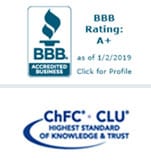

“Can I enroll in Medicare without claiming social security?”
In our office, we hear this question every day.
To some, that may sound surprising; under the current law, most people become eligible for social security benefits at age 62 and Medicare at age 65. However, as we advise most of our clients, claiming social security as soon as you’re eligible is rarely a good idea. Unless you experience a financial crisis or debilitating illness, it’s better to wait until full retirement age (66 or 67, based on your year of birth) to claim your benefits. If you claim before full retirement age, your benefits will be reduced. Additionally, each year that you wait to claim beyond your full retirement age will increase your monthly benefit by 8% (until age 70). In most cases, that means individuals who plan to maximize their social security benefits will end up enrolling in Medicare before they claim social security.
People who claim social security early are often automatically enrolled in Medicare Parts A and B. Their Medicare card arrives in the mail three months before they turn 65, they receive a Medicare welcome package, and Medicare Part B premiums are deducted from their monthly social security check.
If you aren’t receiving social security benefits yet, that process looks a little different. You’ll need to enroll yourself in Medicare Parts A and B during the Initial Enrollment Period. The Initial Enrollment Period begins three months before your 65th birthday and lasts for seven months. You can enroll in Medicare online, over the phone, or in-person at your local Social Security Office.
Make sure to mark your Initial Enrollment Period on your calendar. Failure to claim Medicare Part B (Medical Insurance) on-time will result in a late enrollment penalty after you do enroll. For each 12-month period you were eligible for Part B but failed to enroll, your premium will increase by 10%. This penalty does not apply to individuals who opt-out of Part B, or those who qualify for a special enrollment period because they are covered by health insurance provided by a current employer. Other penalties exist for individuals who delay enrollment in Medicare Part D, as well as Medicare Supplement or Medigap plans.
Besides automatic enrollment, there is another key difference for individuals who enroll in Medicare without claiming social security: premium bills. Part B premiums are usually deducted from social security benefits. But if you aren’t receiving those benefits yet, you will receive a quarterly premium bill from the Social Security Administration. In 2019, the average Part B premium is $135.50 per month. However, single retirees with incomes over $85,000 and married couples with incomes over $170,000 will pay more.


Sara McKinney
saractag@gmail.com
As Cowen Tax Advisory Group’s Digital Content Marketing Specialist, Sara provides in-house copywriting and manages the company’s electronic records system, email marketing, and blog.




